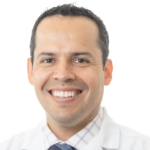With the return of school and fall youth sports, it’s important to be educated on what to watch for in regard to injuries, especially concussions. If a concussion occurs and parents or coaches are not trained in symptoms and proper concussion care, more serious injuries can occur.
Dr. Jaime Pedraza is a Family and Sports Medicine Physician at Avance Care West Cary. Dr. Pedraza specializes in sports medicine, including musculoskeletal injuries, fractures, concussions, acute and overuse or chronic injuries such as arthritis. Dr. Pedraza has years of experience managing sports-related concussions. During his career, he has treated hundreds of concussions in the Triangle area.
How to identify, treat, and manage a concussion: An interview with Jaime Pedraza, MD, CAQSM
What is a concussion?
According to the American Medical Society for Sports Medicine (AMSSM), a concussion which is the mildest form of traumatic brain injury, “is a traumatically induced transient disturbance of brain function.” It is important to know that although a concussion is temporary, a quick identification of it and proper medical treatment, will ensure the fastest possible recovery and return to sports.
What sports is my child most likely to get a concussion from?
Truly speaking, a child can get a concussion from any sport. Now, there are sports with higher risk for a concussion based on their level of physical contact and how strenuous the sport is. Below are how currently sports are divided with the greatest risk sports at the top:
- Collision or contact sports: football, ice and field hockey, soccer, wrestling, basketball, diving, lacrosse, rodeo, ski jumping, water polo and team handball.
- Limited contact sports: baseball, cheerleading, diving, floor hockey, softball, gymnastics, field events (high hump, pole vault) skiing (Nordic or alpine) and volleyball.
- Non-contact and strenuous sports: running, rowing, sailing, swimming, tennis, weight lifting and flied events (shot put, discus, javelin).
- Non-contact and moderately strenuous sports: curling, badminton and table tennis.
- Non-contact and non-strenuous sports: golf.
What are the signs and symptoms of a concussion?
Every concussion and every patient are different. One patient who has two concussions may experience completely different symptoms on one compared to the other one. In general, there are four groups of symptoms:
- Physical symptoms such as headache, dizziness, nausea, vomiting, etc.
- Cognitive symptoms such as feeling “foggy”, difficulty concentrating/remembering, confusion, etc.
- Emotional symptoms such as irritability, sadness, nervousness, etc.
- Sleep symptoms such as drowsiness, more or less sleep than usual and difficulty falling asleep.
What doctor should I seek help from if I suspect a concussion?
If you have any suspicion that your child has a concussion, find a Sports Medicine doctor who specializes in the evaluation, diagnosis and management of a concussion. You can find Sports Medicine doctors at Avance Care by clicking here.
What lifestyle changes should I expect if I have a concussion? (Reduction of screen time, etc.)
If you experience a concussion, you may be recommended to have mental and physical rest. Oftentimes that includes a temporary cessation of sports and physical activity and a modification of school or work activities, such as use of any device with a screen.
How long does it take to recover from a concussion?
Again, every concussion and every patient are different but generally speaking, a concussion may last from a couple of days to a few weeks, depending on how quickly it is diagnosed and properly managed. See your Sports Medicine specialist as soon as you suspect a concussion.
How do you know it is safe to return to activity after a concussion?
Proper return to sports and physical activity is a medical decision by your Sports Medicine specialist based on symptoms as well as physical examination. Once your specialist determines it is safe to return to activities, a personalized plan will be laid out to you to ensure a safe and quick return to your preferred sport or activity.
If you’re wondering if your child has a concussion or are needing to seek treatment, find an Avance Care provider near you by clicking here.

